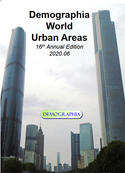Pessimism is the mood of the day, with 80 percent of Americans saying the country is generally out of control. Even before civil unrest and pestilence, most Americans believed our country was in decline, Pew reported, with a shrinking middle class, increased indebtedness and growing polarization. read more »
Urban Issues
What's So Magic About $1 Trillion
News reports say that the Trump Administration is going to propose a $1 trillion infrastructure plan to “boost the economy.” One writer says it will not only promote recovery but also help the environment. read more »
- Login to post comments
The Cloud Over America’s Downtowns
My latest column is online in Governing magazine. It’s called “The Cloud Over the Future of America’s Downtowns” and is about the particular challenge coronavirus related shutdowns pose to the American downtown renaissance. read more »
- Login to post comments
Demographia World Urban Areas, 2020: Tokyo Lead Diminishing
For the first time in more than six decades the world’s second ranked built-up urban area has reached within 10% of leader Tokyo. The 2020 edition of Demographia World Urban Areas reports that Jakarta has reached a population of 34.5 million, behind Tokyo-Yokohama’s 38.0 million (Figure 1). The report can be downloaded here (Note 1). read more »
- Login to post comments
CHAZ, Christiania, and the Autonomous Zones We Really Need
The dream that was CHAZ, the Capitol Hill Autonomous Zone, in Seattle has evaporated nearly as quickly as it originated. After three shootings leaving one man dead and three wounded, the experiment in police-free self-governance is ending. CHAZ, which renamed itself CHOP (Capitol Hill Occupied Protest), never quite figured out what autonomy requires of an autonomous zone. read more »
- Login to post comments
Feudalism and Stagnation in South Africa
As I am writing this article, South Africa is predicted, following the coronavirus crises, to have an unemployment rate of 50% i.e. 1 in 2 working adults .The country’s lockdown has now been longer than the one in authoritarian China and to make matters worse, South Africa’s credit rating has been recently downgraded by agencies such as Fitch, Standard and Poor, and Moody’s. read more »
- Login to post comments
Employment by CIty Sector, Challenges Ahead for Downtowns
New Census Bureau employment data indicates that most job creation in the nation’s 53 major metropolitan areas (over 1,000,000 population) continues to be in the suburbs and exurbs. This article describes employment (job) locations by urban sector, using the City Sector Model (described in the Note Figure 4, below). The source of the data is “County Business Patterns, which is published annually for every zip code in the nation, which is unlike the American Community Survey, which uses a five-year period to cover all areas of the nation. read more »
- Login to post comments
Neo-Feudalism in California
From the beginning, California promised much. While yet barely a name on the map, it entered American awareness as a symbol of renewal. It was a final frontier: of geography and of expectation.
—Kevin Starr, Americans and the California Dream: 1850–1915 read more »
- Login to post comments
The Urban Project: Urbanization, Urbanisms, and the Virus – A Historical Take
Observing and writing 20-some years before the oil embargo (1974) and 30 years before the stern Brundtland report (1987), Jane Jacobs (1961) resolved that density comes in “good” and “bad” varieties. read more »
- Login to post comments
Highest Salaries for Software Developer Remote Work (Metro Areas)
COVID-19 lockdown and social distancing strategies have led to a huge increase in the number of people working at home (working remotely). According to Gallup, by mid-April, 62% of US employees were working at home. Further, Gallup found that about half of the remote workers preferred to continue working from home, with another quarter interested in remote working out of pandemic fears. read more »
- Login to post comments






















